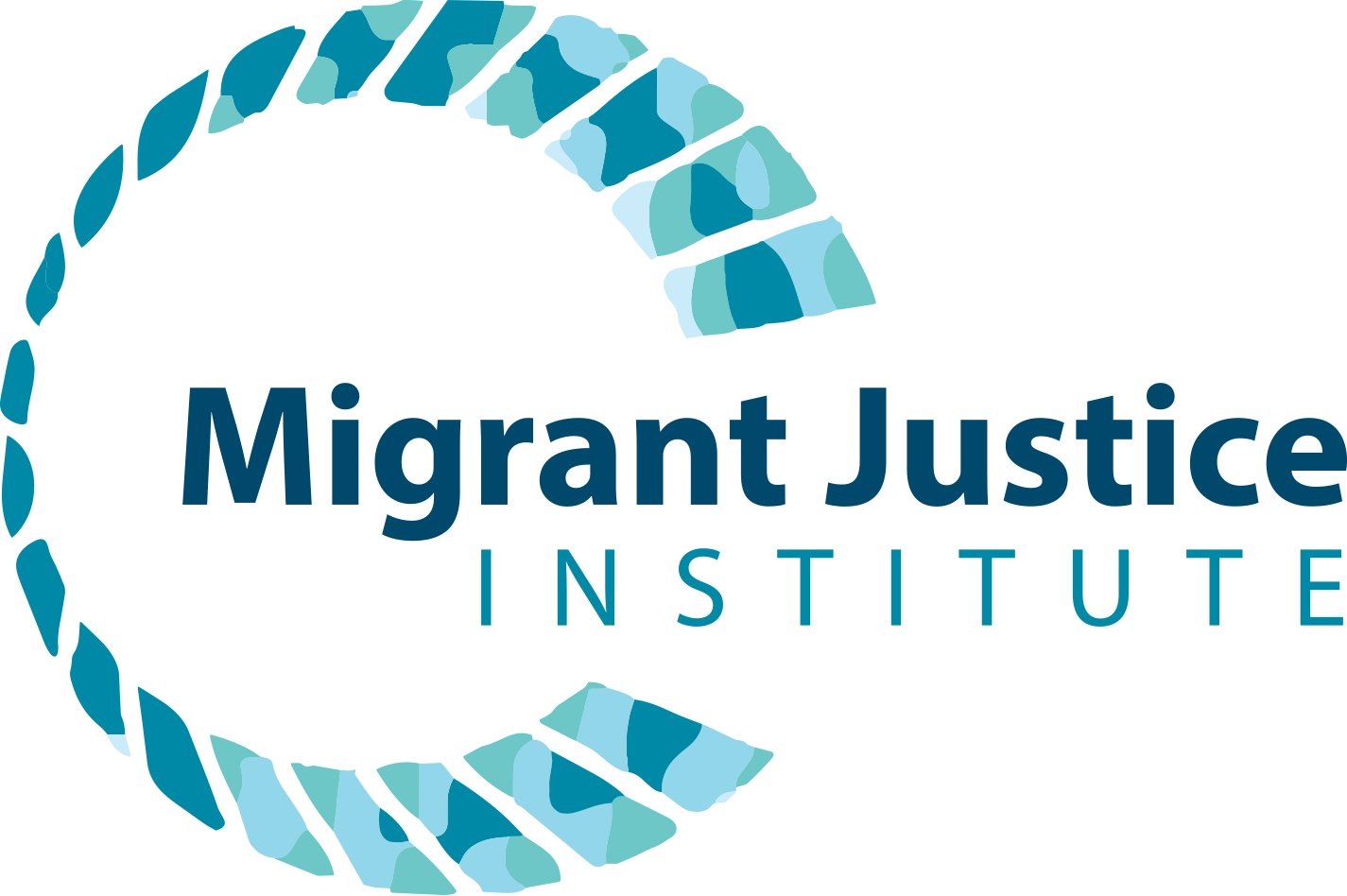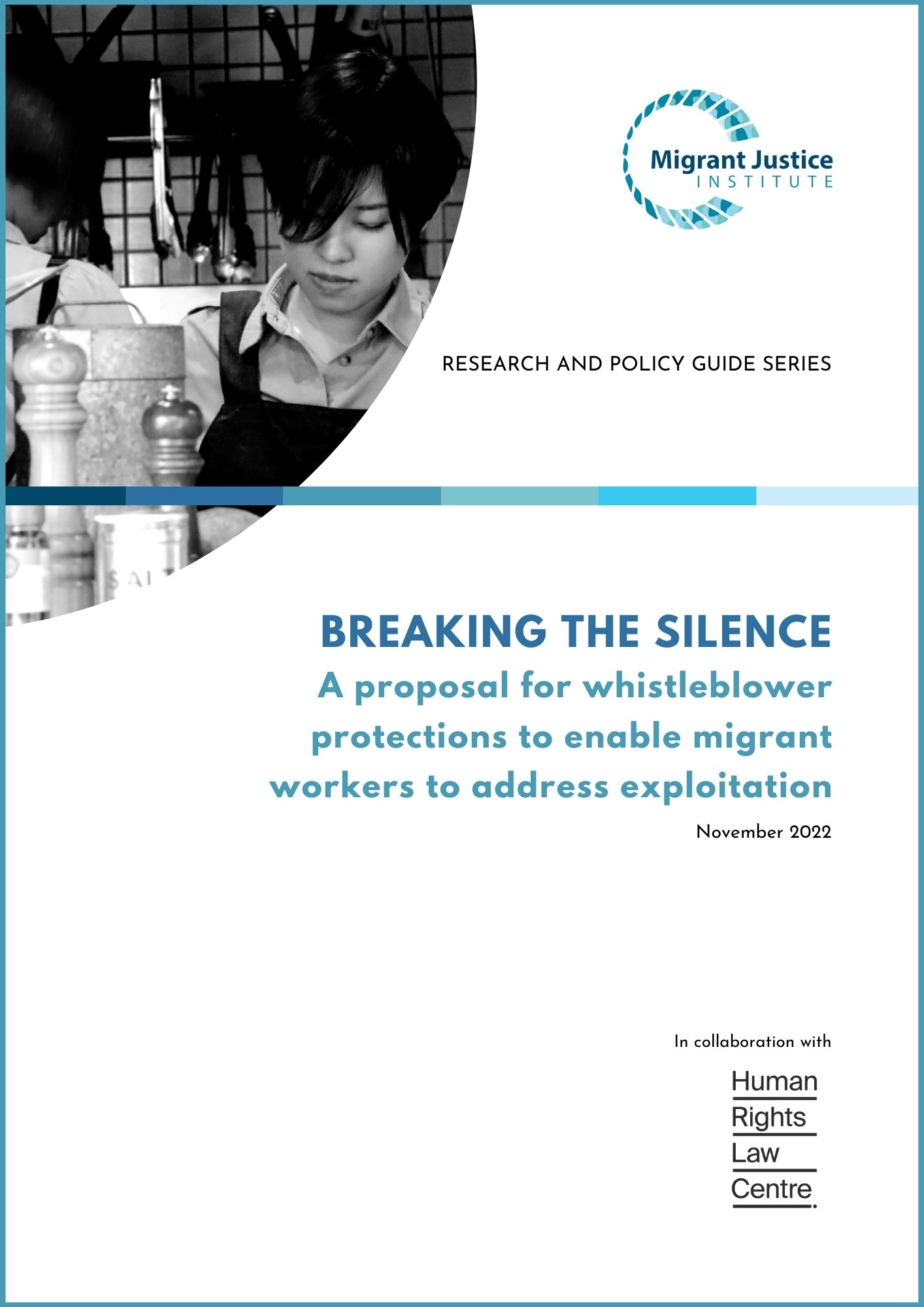BREAKING THE SILENCE – A PROPOSAL FOR WHISTLEBLOWER PROTECTIONS TO ENABLE MIGRANT WORKERS TO ADDRESS EXPLOITATION
Migrant Justice Institute and Human Rights Law Centre have led a national coalition proposing immigration protections for migrant workers who take action against unscrupulous employers. Our detailed proposal is endorsed by over 40 organisations including legal centres, ethnic community state and national peak bodies, unions, churches, and national service providers such as the Salvation Army, AMES and the Settlement Council of Australia.
The problem
Migrant worker exploitation is entrenched in workplaces across Australia. The vast majority of unlawful employer conduct goes unchecked. In our surveys of thousands of migrant workers, three quarters were paid less than the casual minimum wage and, among the underpaid workers, nine in ten told nobody.
Many migrant workers stay silent for fear that if they come forward they will put their visa and stay in Australia at risk or jeopardise a future visa. When migrant workers reach the end of their stay and could potentially safely pursue a labour claim without risk to their job or visa, they are required to swiftly return home. All intelligence about exploitative employers is lost and the worker never recovers the wages they are owed.
The Fair Work Ombudsman (FWO) has limited enforcement capacity and takes a small number of cases each year. Most migrant workers are extremely reluctant seek the regulator’s assistance. In 2017, the Federal Government attempted to address this issue by implementing an Assurance Protocol. Under this scheme, the Department of Home Affairs (DHA) commits to generally not cancel a worker’s visa for breach of work rights if the worker is assisting the FWO with its inquiries. The Protocol has not been effective, with only around 15 migrant workers using it each year.
Because of this regulatory failure, employers know they will not be held to account and underpayment of migrant workers has become a widely successful business model. In some industries, this makes employers that do the right thing uncompetitive. Businesses cannot detect wage theft (or modern slavery) in their supply chains because migrant workers will not report it to auditors or the regulator.
Our proposed reforms
Our proposal sets out two reforms that will help to bring these workers out of the shadows and hold exploitative employers to account:
protection from visa cancellation for exploited migrant workers who have breached their visa but take action against their employer, and
a short-term visa with work rights to pursue a claim before they leave Australia.
How will whistleblower protections contribute to fixing the problem?
These reforms will begin to break the entrenched cycle of exploitation and expand government’s enforcement of labour law by:
Changing employer behaviour by increasing the likelihood that exploitation will come to light and they will be held to account;
Substantially expanding enforcement beyond the limited capacity of government agencies by enabling more employment lawyers and unions to pursue claims on behalf of migrant workers who would not otherwise come forward;
Increasing detection of exploitation among federal and state government agencies by requiring reporting of claims to those regulators;
Increasing business’ ability to detect and address wage theft and modern slavery in supply chains by enabling migrant workers to more safely report it, while not creating any new red tape for businesses that do the right thing and comply with employment laws;
Encouraging migrants to join unions and assisting unions to organise and represent migrant workers; and
Creating new incentives for migrant workers to report forms of exploitation not currently covered by the Assurance Protocol, including workplace health and safety, sexual harassment and discrimination.
Who will benefit from the proposal?
These protections will benefit migrants on a range of temporary visas, as well as those who have overstayed a visa. For example:
An exploited international student who has worked more than 40 hours a fortnight in breach of their visa (often to make ends meet on unlawfully low wages) would be willing to bring a claim against their employer and recover the wages they are owed because they have certainty that their visa would not be cancelled.
A sponsored worker whose employer illegally demanded the migrant pay back the sponsorship fee could access a short-term visa to recover this unlawful payment, before finding another sponsor for a new work visa.
An exploited backpacker who is about to leave Australia but didn’t want to report sexual harassment during their fruit-picking job could access a short-term visa to stay for a short period to hold their employer to account before returning home.
The proposal will also benefit:
Employers that pay their workers correctly and want a level playing field;
Businesses that want to detect and address exploitation and modern slavery in their supply chains;
Federal and state governments that want to strengthen enforcement of labour laws;
Unions that seek to engage and recruit migrant workers;
Consumers that want greater assurance that goods and services are not produced through exploitation of migrant workers; and
All workers in Australia, when employment standards are more likely to be enforced and a race to the bottom is disrupted.
Next steps
The federal government announced that it will introduce reforms to address migrant worker exploitation, and is currently considering the whistleblower protection proposal. We urge the government to introduce these protections as the cornerstone of its reforms, because increased criminalisation of employer misconduct and other reforms will have limited effect if exploitation remains undetected.
This proposal is endorsed by




